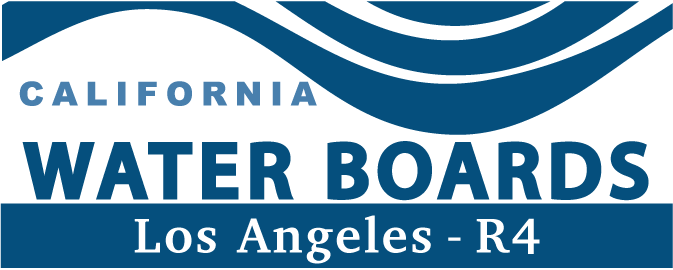Watershed Regulatory
Recycled Water
The Los Angeles Water Board is responsible for issuing recycled water permits or water reclamation requirements (WRRs) to ensure the safe and sustainable reuse of water within the region. Permits are issued under two types: individual permits and enrollments in to the general permit, Statewide Water Reclamation Requirements for Recycled Water Use (Order WQ 2016-0068-DDW or General Recycled Water Permit). Individual permits are tailored to specific projects, which incorporate the applicant's site-specific plans, wastewater treatment processes, and safety measures. Individual permits are typically necessary for complex or large-scale projects that may have unique environmental impacts. Alternatively, the General Recycled Water Permit provides a streamlined process for non-potable recycled water uses. The General Recycled Water Permit does not authorize the following activities:
a. Activities designed to replenish groundwater resources. Groundwater replenishment activities include surface spreading basins, percolation ponds, or injection through groundwater wells.
b. Disposal of treated wastewater by means of percolation ponds, excessive hydraulic loading of recycled water in use areas, etc., where the primary purpose of the activity is disposal of treated wastewater.
c. Direct potable reuse (Wat. Code, § 13561(b)), indirect potable reuse for groundwater recharge (Wat. Code, § 13561(c)), or surface water augmentation (Wat. Code, § 13561(d)).
Nonpotable Reuse
1. Enrollment into the General Recycled Water Permit
Applicants seeking enrollment under the General Recycled Water Permit should submit the following:
- Notice of Intent (NOI) to the Los Angeles Water Board (Attachment A of Order WQ 2016-0068-DDW)
- Title 22 engineering report to the Los Angeles Water Board and Division of Drinking Water (DDW)
- Antidegradation analysis to the Los Angeles Water Board
The Los Angeles Water Board will issue a Notice of Applicability (NOA) based on a review of the NOI, engineering report and DDW’s conditional acceptance letter for the engineering report, and antidegradation analysis.
2. Applying for an Individual Recycled Water Permit
Applicants must submit the following:
- Complete a Report of Waste Discharge (ROWD), also known as Form 200
- Title 22 engineering report
- Salt and Nutrient Management Plans, if developed
- Antidegradation Analysis
Onsite Treated Nonpotable Reuse
The State Water Board is currently developing regulations for onsite treatment and reuse of nonpotable water. These regulations will cover the treatment of nonpotable water sources (such as graywater, rainwater, stormwater, and blackwater) for nonpotable purposes (including toilet and urinal flushing, clothes washing, irrigation, and dust suppression) in multifamily residential, commercial, and mixed-use buildings.
Potable Reuse
Potable Reuse includes indirect potable reuse for groundwater recharge and seawater intrusion barrier projects, aquifer storage and recovery, reservoir water augmentation and direct potable reuse including raw water augmentation and treated drinking water augmentation (California Water Code section 13561).
1. Indirect Potable Reuse (IPR)
The Los Angeles Water Board issues IPR permits as individual permits, and applicants applying for an individual IPR permit must submit the following:
- Complete a Report of Waste Discharge (ROWD), also known as Form 200
- Title 22 engineering report
- Salt and Nutrient Management Plans, if developed
- Antidegradation Analysis
Current IPR projects within the Los Angeles and Ventura Region include:
- Alamitos Gap Seawater Intrusion Barrier Project | Order R4-2014-0111
- Harbor Water Recycling and Dominguez Gap Seawater Intrusion Barrier Project | Order R4-2016-0334
- West Coast Basin Barrier Project | Order R4-2006-0069
- Montebello Forebay Spreading Grounds | Order 91-100, Order R4-2009-0048, Order R4-2009-0048-A01
- Groundwater Reliability Improvement Project (GRIP) | Order R4-2018-0129
- Santa Monica Sustainable Water Infrastructure Project (SWIP) | Order R4-2023-0366
- Oxnard Groundwater Recovery and Treatment (GREAT) Program | Order R4-2020-0051
2. Direct Potable Reuse
Under the State’s DPR framework, the Division of Drinking Water will be the lead permitting agency for issuing DPR permits. The Los Angeles Water Board will provide support to DPR projects by reviewing source control programs, coordinating NPDES and WDR permit renewals with the issuance of DPR permits when applicable, participating in advisory panels and general project consultation.
Enhanced Source Control Program
Enhanced source control is a critical component of direct potable reuse (DPR), where treated wastewater is purified to augment drinking water supplies. Under the Direct Potable Reuse Regulations (SBDDW-23-001), facilities implementing DPR are required to enforce stringent enhanced source control measures to prevent contaminants from entering the wastewater stream. These measures include rigorous monitoring and controlling industrial discharges, identifying and mitigating potential sources of pollutants, and ensuring that only high-quality water enters the treatment process. By implementing enhanced source control, potential contaminants are significantly reduced at the source, thereby safeguarding the quality of the treated water, protecting public health, and maintaining the integrity of potable water supplies.
Links to Recycled Water Information
- State Water Resources Control Board Recycled Water Program
- State Water Resources Control Board Division of Drinking Water
- Recycled Water Policy
- Water Supply Strategy
- Wastewater and Recycled Water Volumetric Reporting
- Water Recycling Funding Program (WRFP) Website
- Statewide Water Reclamation Requirements for Recycled Water Use (Order WQ 2016-0068-DDW)
- Division of Drinking Water Engineering Report Guidelines
- Onsite Treatment and Reuse of Nonpotable Water
- Water Reuse Action Plan
- State Water Resources Control Board Direct Potable Reuse
- Water Reuse Action Plan (WRAP)
- Geotracker



